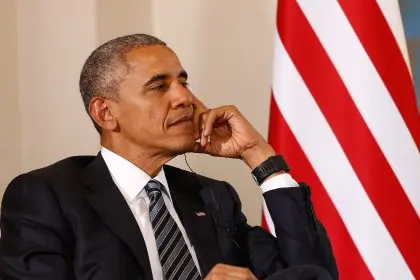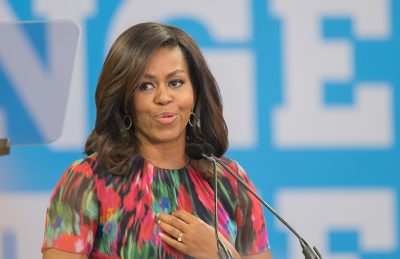Sitting in the same room with Keegan-Michael Key and Jordan Peele is like being in the presence of brothers from another mother. One day following the capacity-filled Atlanta screening of their new film, Keanu, Key and Peele sat in a suite at the Four Seasons and displayed the kind of synergy that often comes from people who share similar DNA. Without hesitation, they rattle off impromptu jokes and finish each other’s sentences like they are the only ones in the room who know what will come next. Indeed, to see their act up close is like witnessing the connectedness of Jordan and Pippen, Montana and Rice, and Dre and Big Boi — only this time, in the comedic form.
Their chemistry, combined with boundary-pushing hilarity, drove their successful Comedy Central series, “Key & Peele.” The sketch comedy show often crushed the line of political correctness and found humor in the bleakest of situations. They tackled uncomfortable subjects such as slavery, police brutality, and the loss of Black identity.
In one popular sketch that has over 75 million views on YouTube, Key plays a substitute teacher (Mr. Garvey) who is hired at a suburban school after years of teaching in the inner city. While taking the class roll, the teacher calls out common names such as Blake and Denise, and assumes that they are pronounced with an ethnic twist. It was a subtle examination of how many Black families in the ‘60s and ‘70s created a new form of Black identity that was lost due to slavery.
“What’s interesting is if you think about it, it’s the first time something has happened like that in thousands of years where people said, ‘we are going to repurpose our own experience,’ ” Key said while discussing the significance of the sketch. “[A] name such as Dejaquan is not African, it’s not American, it’s African American. In the ’60s and ‘70s, it started to become a creative thing. It’s really a uniquely American experience.”
Another popular sketch was their take on President Barack Obama’s alter ego — an aggressive Black man named Luther. Outside of entertainment and sports, Black men are often viewed as a threat if they show any form of aggression. To reach success in most industries, Black men must remain levelheaded and emotionally intelligent. As the first Black president, Obama did not have the luxury of being as combative as Bill Clinton and George W. Bush were while they were in office.
“The ‘Luther’ sketch was originally our attempt to say what we felt like everybody in the country was observing or thinking about the way Obama was being treated,” Peele said. “You had Trump throwing out the birth certificate stuff and questioning Barack Obama’s citizenship. Just like those deep insults. So, for us, it was like Luther bubbled out of us as someone that can say what everybody is thinking. So we know Barack Obama is thinking it as well. If Obama gets too angry or shows too much of his aggression, people are going to think he is just an angry Black man. I think we’re still living in that country.”
Their new film, Keanu, takes a similar approach to what worked well on their sketch comedy series. They take characters and place them in a world where they are forced to deal with a slew of awkward challenges. “We wanted to make a script that was based on the premise of what has occurred in a lot of our sketches,” Peele said. “We wanted to know what would happen if we were to heighten those situations. If we were in certain movies, how would we survive? How would we have to adapt? And so we basically put ourselves in a New Jack City situation and that’s how Keanu was born.”
The result is a nonstop comedy where a man’s friendship with a kitten leads him, and his counterpart, into a deadly underworld of drugs, sex and violence.
Much of Key and Peele’s comedy derives from the storytelling of Richard Pryor, the social examinations of George Carlin, the satire of Dave Chappelle, and the zaniness of Martin Lawrence. They are students of the past greats in comedy and are able to incorporate those aspects into their routines and sketches. But being a comedian in this day and age, it’s hard not to be influenced in some way by the work of Bill Cosby during his stand-up and TV career. So how do Key and Peele come to grips with the comedic art that Cosby created versus the accusations that could forever damage his legacy?
“Honestly, it’s a sad and confusing situation,” Peele said. “There is no real right way to deal with something like this. I like to think that you can enjoy comedy as something that’s universal and you can separate what you know about a person from when you listen to one of their albums. I like to think that, but I’m not going in there for some more Cosby right now.”
Key responded by saying, “We like to think we can be objective about the art, but it’s the same thing like the baseball records that are held by Ty Cobb. No one can top them and he was a horrible human being, so we don’t talk about the records that he still holds. I think you’re inexorably linked. Who you are as a person and how you much you give of yourself truly and authentically, will always be linked to the work that you do. I don’t know if you can separate it. You should be able to separate it like you said, I think you should be able to. It’s weird. Pablo Picasso was apparently a horrible misogynist, but people still go and celebrate the work. When it comes to Cosby, the character, the persona that we all grew to love, I think we all feel betrayed. We thought that was part of what made the comedy work and maybe it didn’t. Maybe it was just good writing. It’s tough.”
Key and Peele’s comedy continues to provide a unique perspective on today’s most touchy issues. But like any great comedian, their impact will be measured on how they connect with generations to come.
“If our movies and our sketches can be seen like Trains, Planes and Automobiles we’ll take that because that will never not be funny,” Key says. “That movie will always be funny. I’d liked the next generations to not understand what the fuss was about. That’s what I would love. I would love for them to say, ‘So it’s a comedy sketch, so it’s funny, so what?’ The most wonderful legacy would be for us to be irrelevant to the next generations, racially not comedically. I would love for the sketches to stand on their own comedically and what it made it special. And hopefully, judged by the fact that we were funny and not judged by being people of color.”
Story by A.R. Shaw
Images by Marcus Ezell
[cigallery]












